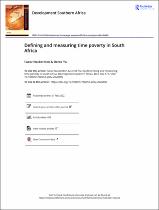Defining and measuring time poverty in South Africa
Abstract
This study primarily adopted the absolute approach to examine time poverty in South Africa by analysing the 2000 and 2010 Time Use Survey data. The findings indicated that absolute time-poor individuals were predominantly young unmarried female Africans who had incomplete primary education, were inactive in the labour market and resided in bigger-sized households in KwaZulu-Natal and Gauteng. Examining the relationship between money-metric poverty and absolute time poverty, the results showed the proportion of people who were both income- and time-poor decreased whereas the percentage of individuals who were neither income- nor time-poor increased over time. Last, money-metric, multidimensional non-money-metric and absolute time poverty headcount rates all declined between 2000 and 2010, but the extent of decrease was greatest in the first rate. © 2022 Government Technical Advisory Centre (GTAC).

